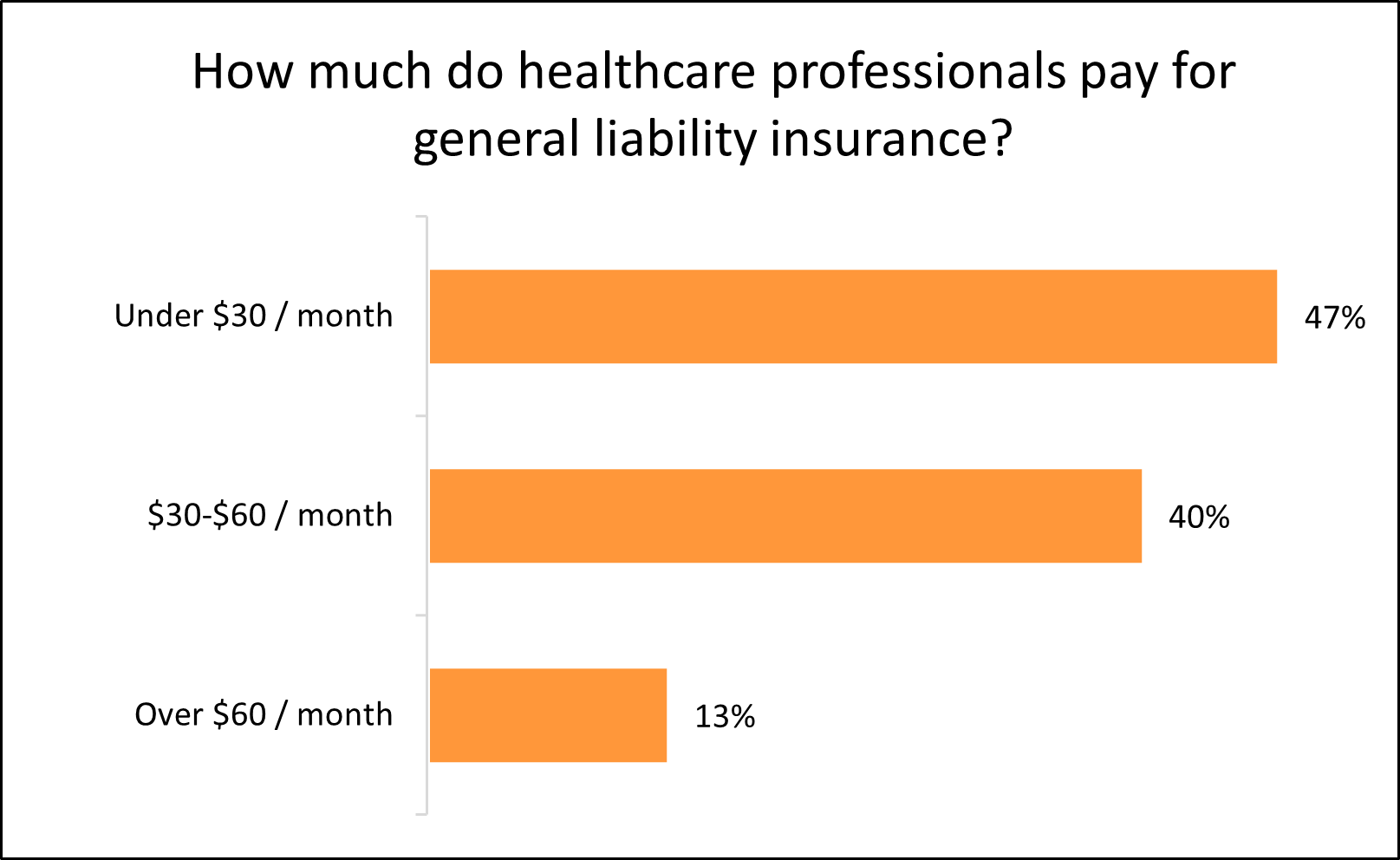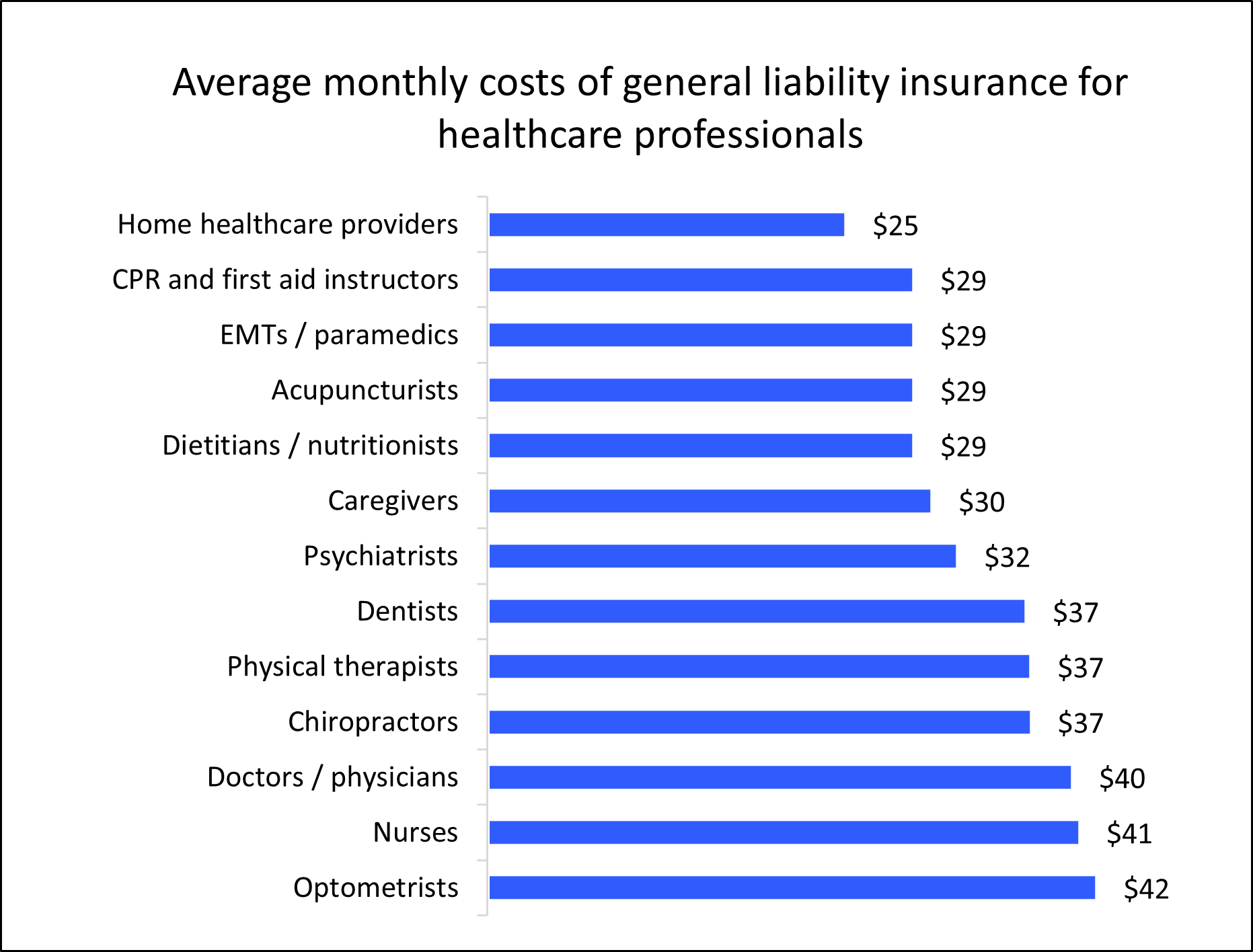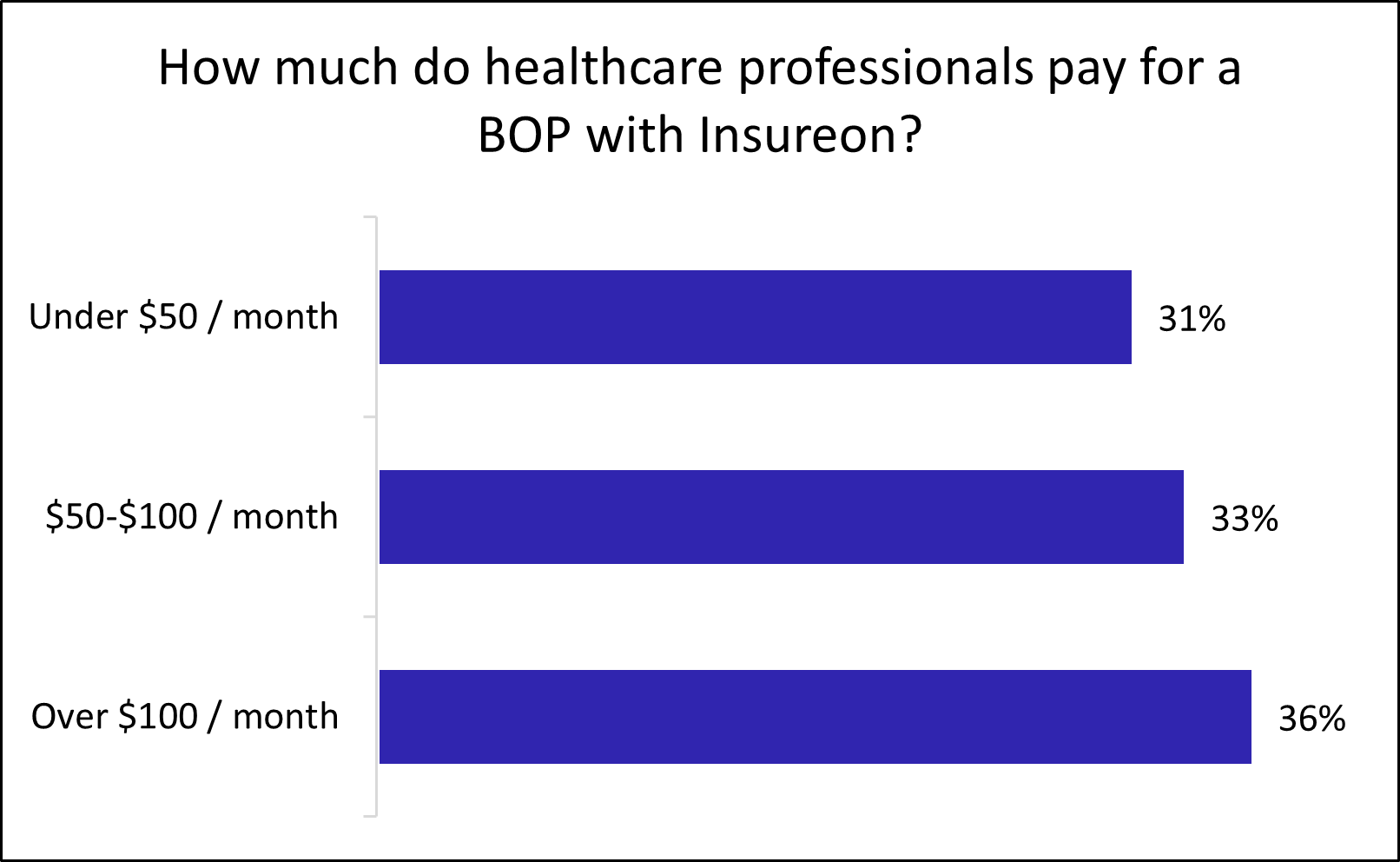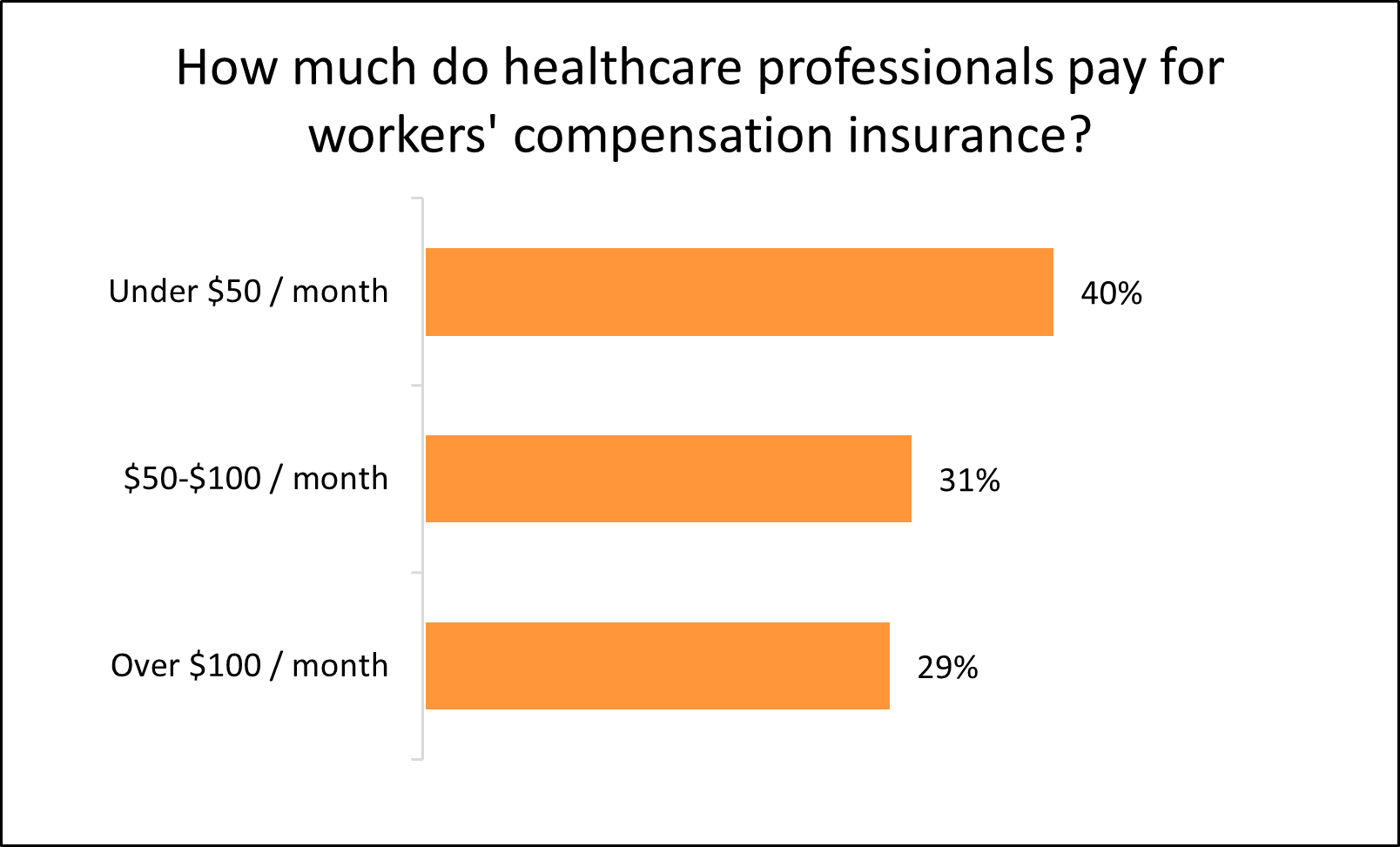
How much does business insurance cost for healthcare professionals?
Healthcare insurance costs are determined by the policies you buy, the risks your business faces, and the number of employees you have. Save on small business insurance costs by comparing quotes from different providers with Insureon.
Key insurance policies and their expected costs for healthcare professionals
Here are the top insurance policies purchased by healthcare businesses and their average monthly costs:
- General liability insurance: $31 per month
- Business owner's policy (BOP): $70 per month
- Workers' compensation insurance: $60 per month
- Professional liability insurance: $42 per month
- Cyber insurance: $79 per month
- Commercial auto insurance: $216 per month
Our figures are sourced from the median cost of policies purchased by Insureon healthcare customers. The median offers a better estimate of what your business is likely to pay because it excludes outlier high and low premiums.
General liability insurance
Healthcare businesses pay an average of $31 per month, or $376 annually, for general liability insurance.
General liability insurance covers common third-party lawsuits from patients, including those related to patient bodily injury, damage to a patient's property, and advertising injury.
This is the average policy for healthcare professionals who buy from Insureon:
Insurance premium: $31 per month
Policy limits: $1 million per occurrence; $2 million aggregate
Deductible: $500
Healthcare companies can often save money by bundling general liability coverage with commercial property insurance in a business owner’s policy (BOP).
This discounted bundle covers common liability lawsuits from customers, and also pays for the cost of stolen, damaged, or destroyed business property.
The cost of general liability insurance depends on several factors, such as the coverage limits you choose, the size of your business, the amount of foot traffic you have, your location, and any additional insured endorsements you add.
Industry risk affects the cost of general liability insurance
The cost of general liability insurance depends on your risk of a customer lawsuit.
Among healthcare businesses that purchase general liability insurance with Insureon, 47% pay less than $30 per month and 87% pay less than $60 per month.
Across all healthcare professions, learn how to find affordable general liability insurance.

Your profession is the biggest factor in determining costs
Businesses that interact with many customers and have a higher risk of accidents typically pay more for general liability insurance.
For example, optometrists can expect to pay more for general liability insurance than home healthcare providers and other lower risk professionals. The average monthly cost for an optometrist is $42, while the monthly average for a home healthcare provider is $25.
Other factors that affect your premium include your business revenue, building maintenance, and the number of years you've been in operation.
As you can see, the cost varies significantly across different healthcare professions:

Policy limits affect the cost of general liability insurance
Policy limits are the maximum amounts your insurance company will pay for covered claims.
The per-occurrence limit is the maximum your insurer will pay for a single incident, while the aggregate limit is the maximum your insurer will pay on any claims during your policy period, typically one year. Higher limits cost more – and provide better coverage.
Most healthcare businesses (83%) choose general liability liability policies with a $1 million per-occurrence limit and a $2 million aggregate limit. As your small business grows, you may need to expand your policy limits.
Business owner’s policy
Healthcare companies pay an average of $70 per month, or $841 per year, for a business owner’s policy.
A business owner's policy, or BOP, bundles general liability coverage with commercial property insurance to cover both third-party risks and your business property. It typically costs less than purchasing each policy separately.
A BOP protects against customer injuries and property damage, along with damage to your healthcare equipment and tools. Because of its increased coverage and affordability, it’s the policy most often recommended by Insureon’s agents.
This is the average BOP for healthcare businesses that buy from Insureon:
Insurance premium: $70 per month
Policy limits: $1 million per occurrence; $2 million aggregate
Deductible: $1,000
Small, low-risk healthcare businesses are often eligible for a business owner's policy.
Healthcare business owners may see higher costs if they choose to add endorsements to their policy. Insurance endorsements, such as business interruption insurance or equipment breakdown coverage, are often recommended to help avoid financial losses if a fire or power outage forces your business operations to cease for an extended period of time.
The cost of a business owner's policy is based on a number of factors, including the value of your property, where you are located, the number of employees you have, and your profession.
Business property value drives the cost of a BOP
Among healthcare businesses that purchase a business owner’s policy with Insureon, 31% pay less than $50 per month and 64% pay less than $100 per month.
Businesses with large premises, such as a dentist’s office with two floors, typically pay more for a BOP than healthcare businesses with smaller premises, such as a compact CPR training class. Your industry risk, building maintenance, years in operation, and location will also affect your premium.


Workers’ compensation insurance
For healthcare businesses, workers’ compensation insurance costs an average of $60 per month, or $722 per year.
This insurance policy covers medical expenses when an employee is injured on the job, and it also provides disability benefits while they're recovering and unable to work.
To comply with your state’s requirements and avoid penalties, healthcare businesses typically must purchase this coverage for their employees. It's also recommended for sole proprietors, as health insurance plans can deny claims for medical bills when an injury or illness is related to your job.
Most policies include employer's liability insurance, which covers the cost of lawsuits related to workplace injuries. There's usually no limit to how much a workers' comp policy can pay for employee benefits, though it depends on state laws.
The cost of workers' compensation insurance depends on several factors, including the number of employees you have and the level of risk involved with their jobs.
Get more information on how to find affordable workers' compensation coverage.
The cost of workers’ comp depends on the number of employees
Among healthcare companies that buy workers’ compensation insurance with Insureon, 40% pay less than $50 per month and 71% pay less than $100 per month.
Workers' comp costs depend on the number of employees you have in your small business. A larger workforce brings a higher risk of worker injuries, which is why bigger businesses tend to pay more for this type of insurance.

Professional liability insurance / Medical malpractice insurance
Healthcare businesses pay an average of $42 per month, or $504 annually, for professional liability insurance. This policy is sometimes referred to as errors and omissions insurance (E&O) or medical malpractice insurance.
Professional liability insurance offers critical coverage for healthcare providers, including legal fees related to accusations of professional negligence. For example, if a nurse prescribes the wrong amount of medication to a patient and they decide to sue, this policy would cover the costs of the resulting lawsuit.
This is the average professional liability policy for healthcare businesses that buy from Insureon:
Premium: $42 per month
Policy limits: $1 million per occurrence; $3 million aggregate
The cost of professional liability insurance or malpractice insurance for healthcare professionals depends on several factors, such as your line of work, claims history and the policy limits you choose.
Cyber insurance
Healthcare business owners pay an average of $79 per month, or $952 annually, for cyber insurance. You might also see this policy called cyber liability insurance or cybersecurity insurance.
Cyber insurance helps healthcare businesses recover financially after a data breach or cyberattack. It can help pay for customer notification costs, fraud monitoring services, and other costs necessitated by state data breach laws.
The cost of cyber insurance depends on the amount of personal information handled by your business, such as customer credit card numbers, along with the number of employees who can access that information.
Commercial auto insurance
Healthcare companies pay an average of $216 per month for commercial auto insurance, or $2,589 annually.
Most states require this coverage for vehicles owned by a healthcare business. For personal, rented, and leased vehicles used by your business, look to hired and non-owned auto insurance (HNOA) instead.
A commercial auto policy provides financial protection in the event of an accident involving your business vehicle. It can help pay for property damage, medical costs, and legal expenses.
The cost of commercial auto insurance depends on several factors, including the policy limits you choose, coverage options, the value of the vehicles, and the driving records of anyone permitted to drive.
Learn more about how to find affordable commercial auto insurance coverage.
Explore insurance costs for your business
We also cover healthcare facilities and therapy and counseling professionals.
How do you buy healthcare professional insurance with Insureon?
Insureon works with top-rated U.S. providers to find affordable insurance coverage for healthcare professionals, whether you work independently as a nutritionist or own a medical staffing company with several employees.
Apply today to get free quotes with our easy online application. A licensed insurance agent who specializes in your profession's unique risks will help you find the right types of healthcare insurance for your business needs. Typically, you can get a certificate of insurance within 24 hours of submitting your application, offering instant peace of mind.













